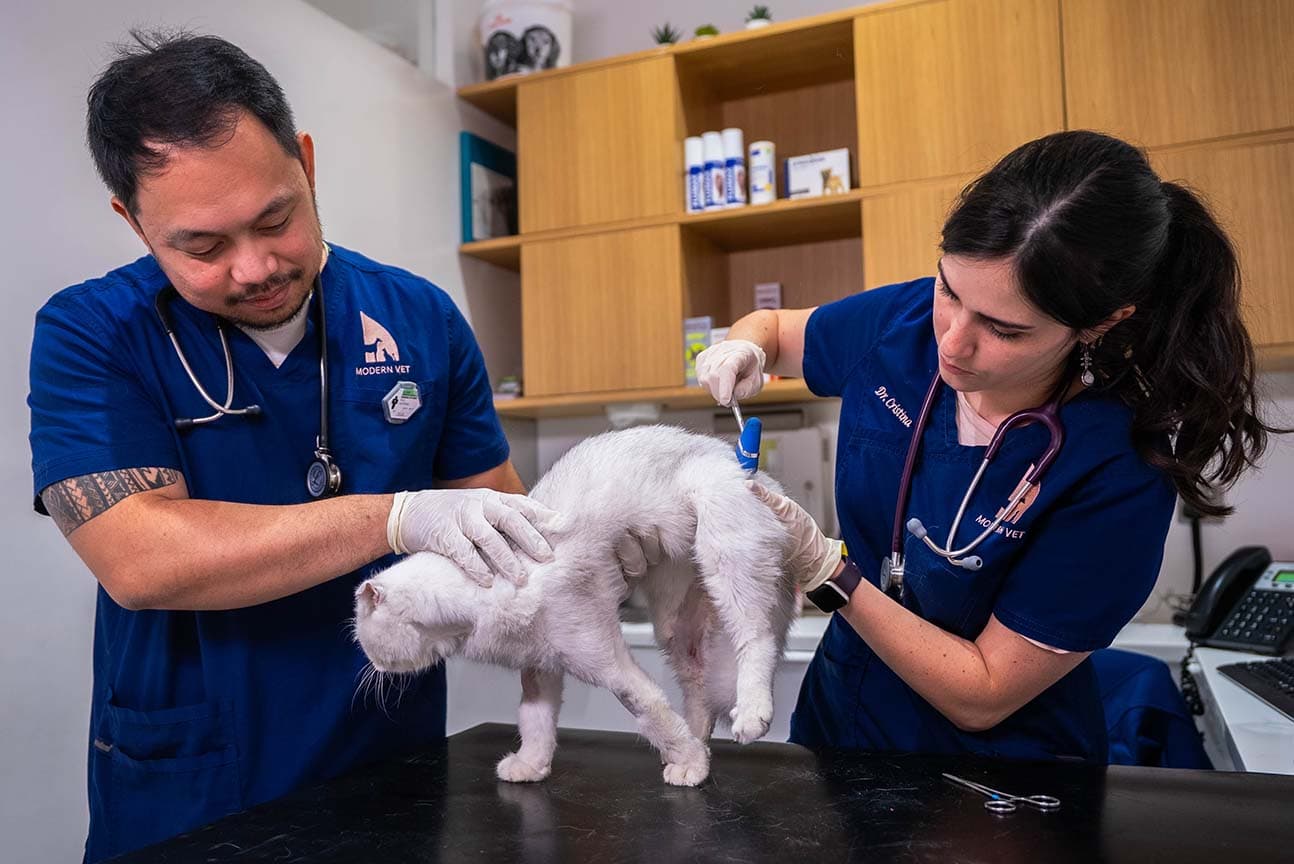Reviewed by Dr. Ionut Rusu
Updated on 05/09/2025
Reading time 4 min.
Overview
Severity: Low
Life stage: All
Vomiting is a common health problem in cats and often a source of worry for owners. While it can be upsetting to see your cat bring up food or fluid, many cases resolve quickly, either on their own or with simple adjustments to diet and routine.
Most cats in Dubai live indoors in air-conditioned homes, which can bring unique considerations for their health and digestion. By understanding the possible causes, signs to look out for and the risks associated with vomiting, you can better judge when it’s safe to manage the problem at home and when your cat needs urgent veterinary attention.
What to do if your cat is vomiting
First 2-4 Hours:
- Remove all food, but leave fresh, cool purified or bottled water available
- In Dubai’s heat, ensure your cat stays in air-conditioned areas
- Encourage small sips of water every 15-20 minutes rather than letting them gulp large amounts
- Monitor your cat closely for additional or worsening symptoms
After the Initial Period:
- If no further vomiting occurs, offer a teaspoon of bland food every 2 hours
- Suitable options include plain boiled chicken or white fish (avoid seasoning)
- Room temperature food works best in Dubai’s climate
Important: If your cat cannot keep water down or continues vomiting, contact your veterinary clinic immediately. Dehydration occurs rapidly in the UAE’s climate, even with air conditioning.
Common causes of vomiting in cats
Dietary Issues: Indoor cats in Dubai often experience vomiting due to eating too quickly, especially during cooler evening hours when appetite increases. Sudden changes in imported pet food brands or feeding schedule disruptions during Ramadan can also trigger episodes.
Hairballs: With limited outdoor access, Dubai cats spend more time grooming, leading to increased risk of hairballs. Long-haired breeds like Persians, popular in the UAE, are particularly susceptible.
Indoor environment risks:
- Air conditioning filters and dust accumulation
- Houseplants: Many common Dubai indoor plants are toxic to cats
- Cleaning products and air fresheners used in enclosed spaces
- Overcrowding, bullying, and changes in the household
Health conditions:
- Blockages: Foreign objects, severe hairballs or intestinal growths
- Food allergies and intolerances: Reactions to specific ingredients in commercial cat foods
- Organ disease: Liver, kidney or pancreatic conditions
- Infections: Indoor cats are still vulnerable to viral (panleukopenia, coronavirus) or bacterial infections (Salmonella, Campylobacter)
Exposure to toxic or harmful substances in Dubai Homes:
- Human medications: Paracetamol and ibuprofen are extremely dangerous
- Household cleaning products
- Essential oils used in diffusers
- Antifreeze from car maintenance
When to be worried about your vomiting cat
Given Dubai’s climate and the indoor lifestyle most cats lead, certain symptoms require immediate veterinary attention.
Seek emergency veterinary care if your cat:
- Vomits continuously for more than 24 hours
- Has blood or black dots like coffee grounds in their vomit
- Is trying to vomit, but nothing comes up
- Develops signs of dehydration, including dry, sticky gums, lethargy, and skin tenting
- Appears in pain or distress: including hunched posture, yowling, or withdrawn
- Feels hot to touch, despite air conditioning and cooling
- Is breathing very quickly or open-mouth breathing
Schedule a vet appointment within 24 Hours if your cat:
- Vomits multiple times in one day
- Refuses food or water
- Is not using their litter tray as normal
- Becomes withdrawn and quieter than usual
- Has, or may have eaten something harmful, including toxic houseplants, chemicals, or foreign objects
Modern Vet’s Dubai clinics are well-equipped to handle these situations, with many offering 24-hour emergency services.
Tips to Prevent Your Cat From Vomiting
General Prevention:
- Feed a complete, high-quality food that adheres to Dubai’s import standards
- Groom your cat regularly to reduce the likelihood of hairballs
- Store human medications and cleaning products in secure cat-proof containers
- Schedule annual health checks at your Dubai veterinary clinic
- Keep your cat up-to-date with vaccinations and worming preventives
Prevention measures in Dubai:
- Climate Control: Maintain consistent air conditioning to prevent stress-related vomiting
- Water Quality: Use filtered water, as Dubai’s desalinated water can sometimes cause stomach upset in sensitive cats
- Indoor Safety: Remove toxic houseplants common in Dubai homes, including lilies, sago palms, and oleander
- Feeding times: Keep to regular meal times, even during seasonal changes in routine
- Store food in secure, air-tight containers in a climate-controlled room
How to Know If Your Cat Is About to Be Sick
Recognising early warning signs helps you prepare and respond appropriately.
Pre-vomiting Behaviour:
- Restlessness and seeking cool surfaces: common in Dubai homes
- Drooling or lip licking
- Making repeated swallowing motions
- Hiding in air-conditioned areas or behind furniture
- Heaving: stomach movements visible along the abdomen
Types of Vomit and What They Mean:
- Undigested food: Usually indicates eating too quickly or food intolerance
- Yellow bile: Empty stomach vomiting, often from delayed feeding
- White foam: Usually hairballs or an empty stomach
- Blood: Ulceration or significant damage to the stomach lining. Requires immediate veterinary attention
How to Treat a Vomiting Cat at Home
Immediate Care in Dubai’s Climate
- Ensure access to air conditioning to prevent additional stress
- Offer small amounts of room-temperature water frequently
- Consider electrolyte solutions designed for pets: available from your vet or at larger pet stores
- Tuna water (from tins in spring water) can encourage your cat to drink
Feeding Protocol
After 2-3 hours without vomiting:
- Start with tiny amounts (1 teaspoon) of bland food.
- Plain boiled chicken or white fish works well for most cats.
- Prescription gastrointestinal diets support rapid recovery while providing balanced nutrition. These are essential for young growing kittens under 6 months and frail cats in poor body condition.
- Feed every 2-3 hours initially, then gradually increase portions as symptoms improve.
- Once symptoms have resolved, gradually transition back to a normal diet over 4-5 days. This gradual return is particularly important in Dubai, where stress from changes in any routines can trigger setbacks.
How Vets Treat Vomiting in Cats
Your vet will conduct a thorough examination and may recommend further tests, such as:
- Blood tests to check organ function and hydration levels
- Imaging: X-rays or ultrasound to identify blockages and structural abnormalities in the gut wall
- Specific blood tests, exploratory surgery, biopsies – for complex cases
Treatment options:
Depend on severity and underlying cause
- Emergency fluid support: Fluids given directly into your cat’s veins for rapid rehydration in severe cases
- Anti-sickness and anti-nausea medications
- Antacids and gastric protectants to reduce stomach irritation and promote healing
- Specific treatments for diagnosed underlying causes
Cats at a higher risk of vomiting
Any cat may vomit at some time, irrespective of their age, breed or lifestyle, but some factors will increase the risk.
Higher Risk Cats:
- Cats with other illnesses, including diabetes, hyperthyroidism, and kidney disease
- Elderly cats: More susceptible to other health issues and poorer digestion
- Outdoor cats who hunt small prey
- Purebred cats: Some breeds, like Siamese and Burmese, have inherited factors
- Cats eating wet or raw food diets: Greater risk of contamination or food spoilage
- Unwormed and unvaccinated cats
Additional risks for Dubai and indoor lifestyle:
- Recently-relocated cats: Stress from moving to Dubai can trigger vomiting.
- Cats living in busy multi-cat households: Stress from confined living, lack of opportunity to express normal behaviours, and competition for resources.
- Changing household routines and make-up during cultural celebrations.
Worried about your cat’s vomiting? Book a checkup or emergency appointment today at Modern Vet Hospital in Dubai. Our caring team understands how distressing it can be when your feline friend is unwell, and we’re here to help. We provide thorough diagnostic services, gentle emergency treatment, and compassionate continuing care tailored specifically to your cat’s needs. From routine wellness checks to urgent vomiting episodes, Modern Vet Hospital is your trusted veterinary partner in Dubai for comprehensive, empathetic pet care that puts both you and your cat at ease.
Share this, choose your platform!
Reviewed by
Dr. Ionut Rusu
USAMV, RCVS
Dr. Ionut Rusu is a senior veterinarian with nearly a decade of successful experience in the field. He graduated in 2014 from the University of Agricultural Sciences and Veterinary Medicine (USAMV) in Cluj-Napoca, Romania.


